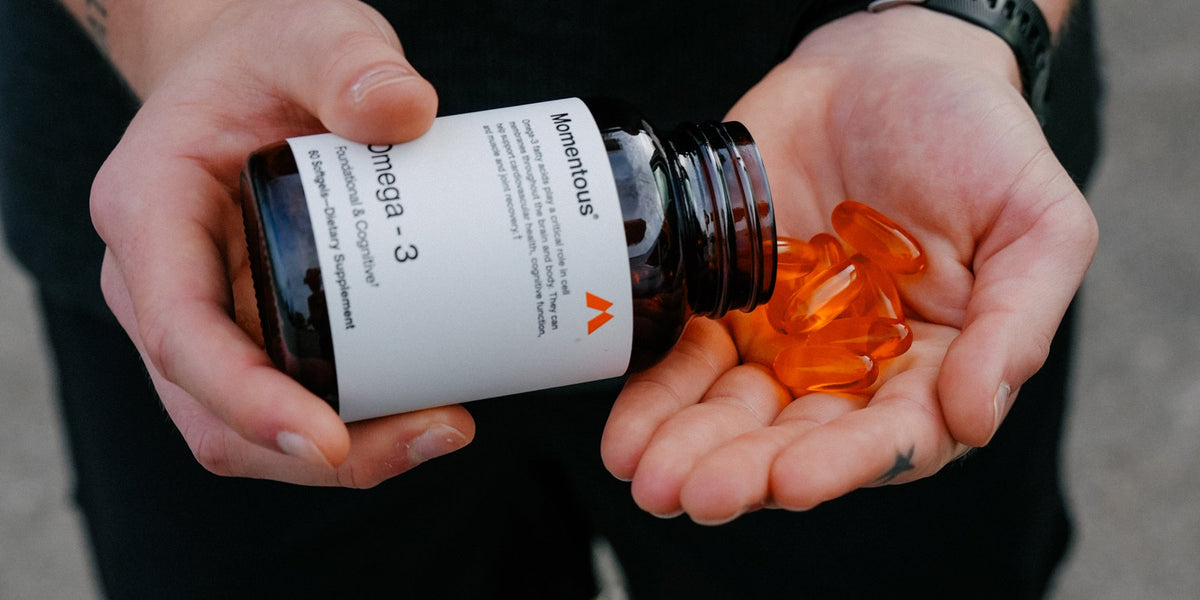
Not All Omega-3s Are Created Equally
|
|
Where your omega-3 supplement comes from and how it’s been manufactured can have a huge impact on its quality, potency, and purity. Omega-3 is one of the three products that makes up our Momentous Three and is widely considered a core nutrient that when taken daily can help improve physical and cognitive health. But with so many omega-3 supplements on the market, it’s never been more important to know how your product has been sourced, manufactured, and tested.
Let’s explore some of the factors that can impact the quality of an omega-3 supplement.
Sustainably Sourced: Higher-quality omega-3s are derived from sustainable sources like wild-caught fish (e.g., sardines and anchovies). They undergo rigorous purification processes to remove contaminants such as heavy metals, dioxins, and PCBs (polychlorinated biphenyls, which are a group of industrial chemicals that can be found in fish).
Farmed Fish: Lower-quality omega-3 products may come from less reputable sources, such as farmed fish, which can be exposed to higher levels of contaminants. Purification processes might be inadequate, leading to higher levels of pollutants.
High Concentrations of EPA and DHA: Higher-quality omega-3s typically contain high concentrations of EPA (eicosapentaenoic acid) and DHA (docosahexaenoic acid), the most beneficial forms of omega-3s. They are often available in triglyceride form, which is more easily absorbed by the body.
Lower Bioavailability: There are usually lower concentrations of EPA and DHA in lower-quality omegas and they can be in the ethyl ester form, which is less bioavailable and harder for the body to absorb.
Minimal Fishy Odor or Taste: With higher-quality omega-3 supplements freshness is maintained through proper storage and the addition of antioxidants like vitamin E to prevent oxidation. High-quality products will have minimal fishy odor or taste.
Rancid and Harmful: Lower-quality products can be prone to oxidation, leading to rancidity. Oxidized omega-3s not only have an unpleasant taste and smell but can also be harmful to health.
Testing and Transparency: Higher-quality omega-3 products are produced in facilities that follow Good Manufacturing Practices (GMP) and are often third-party tested for quality assurance. Labels are transparent, listing the exact amounts of EPA and DHA.
Less Stringent Quality Control: Lower-quality products may be produced in facilities with less stringent quality control. Labels might be vague or misleading, not specifying the exact amounts of EPA and DHA.
Optimal Absorption: The best omega-3 supplements are formulated for optimal absorption, using delivery systems like enteric coatings to prevent breakdown in the stomach and ensure absorption in the intestines.
Reduced Bioavailability and Efficacy: Lower-quality omegas may lack advanced delivery systems, leading to reduced bioavailability and effectiveness, effectively rendering the product futile.
Certified and Eco-Friendly: Often certified by organizations like MSC (Marine Stewardship Council) for sustainable fishing practices, high-quality omega-3s typically support eco-friendly and ethical harvesting practices.
Overfishing and Environmental Damage: Lower-quality omega-3 brands might not adhere to sustainable or ethical practices, contributing to overfishing and environmental degradation.
Backed by Research: High-quality omega-3s are typically backed by clinical research demonstrating their efficacy for various health benefits, including heart health, brain function, and inflammation reduction.
Lacking in Clinical Evidence: Lower-quality products may lack substantial clinical evidence supporting their effectiveness.
Premium Price for a Premium Product: High-quality omega-3s are generally more expensive due to better sourcing, purification, and manufacturing practices.
Health and Quality Risks: While cheaper, lower-quality products will likely come at the expense of quality and potential health benefits.
In summary, high-quality omega-3 supplements offer better purity, concentration, bioavailability, and safety, often supported by rigorous testing and ethical practices, making them more reliable and effective compared to their low-quality counterparts.
"Very high concentrations of DHA. No filler. Excellent product."
-Brendan K.
This has made a huge impact on the arthritis in my hands! Much less pain and only minimal morning stiffness. I tell everyone about it!
-Kala N.
I tried this product based on good reviews! I love how it has helped with my labs. Glad I found something that works!
-Lisa B.
Sourced from anchovies, sardines, and mackerel that contain lower levels of heavy metals, Momentous Omega-3 delivers a potent 1600mg combined EPA and DHA in a 1:1 ratio without the fishy aftertaste.
It can help support cardiovascular health, cognitive function, and muscle and joint recovery. It’s also NSF Certified for Sport ensuring peace of mind that it’s free from heavy metals, contaminants, and banned substances.